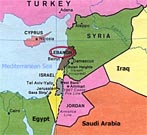Lebanon prepares to elect president
 Amsheet, Lebanon - Lebanon was preparing Saturday to elect a new president after a six-month delay amid hopes that the appointment will bring unity and stability to the politically-deadlocked country.
Amsheet, Lebanon - Lebanon was preparing Saturday to elect a new president after a six-month delay amid hopes that the appointment will bring unity and stability to the politically-deadlocked country.
Some 127 MPs were poised to elect army commander General Michel Suleiman, 59, as president on Sunday at a parliamentary session that would be attended by 200 dignitaries, among them the foreign ministers of Syria and Iran as well as a US congressional delegation.
Other foreign dignitaries expected to attend included Qatar's emir, Sheikh Hamad bin Khalifa al-Thani, the foreign ministers of France, Italy and Spain, EU foreign policy chief Javier Solana, Arab League Secretary General Amr Mussa, as well as foreign and Arab ambassadors in Lebanon.
The streets were full of red and white Lebanese flags as well as pictures of the incoming president.
"Lebanon awaits the leader" said a placard with a large picture of the new president.
In Amsheet, 40 kilometres north of Beirut, and the hometown of the new president, red and white balloons floated over the streets and pictures of the new president were on every balcony.
"Amsheet is awaiting the election of its son as president to unite Lebanon and help Lebanon pass on to a new phase of stability and peace," said Nazem al Khoury, a close friend of the president.
The family house of the future president was also covered with his pictures and Lebanese flags.
People on the streets on Amsheet expressed their happiness and said " Amsheet is awaiting Sunday with love and festivities to welcome the new president."
Qatari mediation during talks in Doha brokered a deal on Wednesday which ended Lebanon political crisis. Earlier this month the standoff degenerated into violence, killing 82 people and pushing Lebanon to the brink of another civil war.
Ali Hamdan, spokesman for parliament speaker Nabih Berri, told Deutsche Presse-Agentur dpa that around 200 dignitaries were invited to attend the election session.
Prime Minister Fouad Seniora, who enjoys the support of Arab countries as well as the US and the West, and members of his current cabinet have also been invited to attend.
Hamdan said a US congressional delegation had been invited and would be headed by Representative Nick Rahal, a West Virginia Democrat of Lebanese origin.
"The speaker wants this election to represent the unity and reconciliation wedding of Lebanon," Hamdan said.
Suleiman will have tough challenges to tackle during his six-year term.
The Doha accord called for Suleiman's election, a national unity government in which the opposition has veto power and a new law for parliamentary elections due next year.
According to the Lebanese daily An Nahar on Saturday, the electoral law will not be amended during Sunday's session as earlier was reported.
Despite the fact that that the Doha accord brought the country back from the brink of civil war, it failed to address many key issues, including the weapons of the militant Hezbollah movement.
Under the deal, Suleiman will choose three ministers in the new 30-member cabinet and he will head a dialogue between the Lebanese opposition and the ruling majority during which the Hezbollah arsenal will be discussed.
Suleiman was quoted by An Nahar as saying Saturday that "I cannot save the country on my own ... this mission requires the efforts of all."
"Security in the country is not achieved by force, but by a joint political will."
Suleiman has managed in his nearly 10 years as armed forces chief to take a neutral stand from all rival parties in the country and to keep the army united despite the political bickering that has prevailed in the country for the past 18 months.
The Lebanese political crisis started in November 2006 when six pro-Syrian ministers quit the cabinet in a bid to force the force ruling bloc to give the opposition more representation in the government.
The Lebanese parliament has failed 19 times to elect a president due to the political deadlock. The presidential office has been vacant since November 23, 2007 when pro-Syrian president Emile Lahoud ended his term.
Suleiman, who hails from the Maronite Christian community from which Lebanon's presidents are usually chosen according to the constitution, believes that religion should not play a key role in Lebanon's politics.
The Lebanese standoff has been widely linked to regional differences pitting the United States against Syria and Iran.
Suleiman joined the army in 1967, following in the footsteps of his father, a member of the Internal Security Forces.
He graduated from the military academy in 1970 and moved up the ranks until being appointed to the job in December 1998. He will be the third military man to become president of Lebanon after Fouad Chehab in the 1960s and Lahoud.
He is expected to win some 110 votes in the 127-seat parliament - some MPs have objected to a military man becoming president. (dpa)